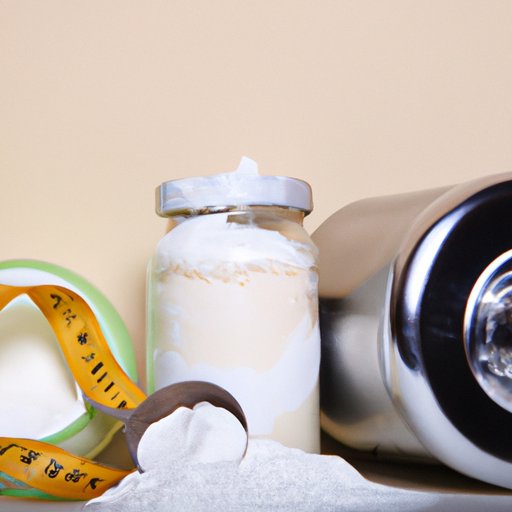
Introduction
Creatine is a popular supplement that is often associated with weight gain. However, many common misconceptions about creatine causing excess weight or making people look “bulky” are simply false. In this article, we will explore the truth about creatine and weight gain, as well as provide evidence-based strategies for maximizing the benefits of this supplement without experiencing unwanted weight gain.
The Truth About Creatine and Weight Gain: Dispelling the Myths
One of the most common misconceptions about creatine is that it will make you gain excess weight or “bulk up.” However, scientific research has repeatedly shown that this is not the case when creatine is used properly. This can be harmful to people’s training, who may avoid using creatine when it could benefit them.
Many people assume that any weight gain from creatine must be due to water retention. While it’s true that creatine can increase water retention in muscles, this does not necessarily translate to overall weight gain. In fact, studies have found that any weight gain caused by creatine is typically minimal, and can often be attributed to improved muscle mass and strength rather than excess body fat.
Research has also shown that creatine does not slow down metabolism or cause unwanted fat gain when used correctly. One possible explanation for these myths is that people who start taking creatine suddenly feel hungrier and end up eating more, which can result in weight gain. However, this is not due to creatine directly but rather behaviour changes in individuals.
Maximizing the Benefits of Creatine: How to Avoid the Weight Gain
When used properly, creatine can offer numerous benefits without causing unwanted weight gain. To maximize the benefits of creatine, proper dosing is vital. It is recommended to take creatine in two phases: a loading phase of 20 grams per day for the first five days, followed by a maintenance phase of 3-5 grams per day. Although you can skip the loading face, this is a more effective way to get its maximum benefits.
Timing is also important. Ideally, you should take creatine before or after a workout for optimal efficacy as during the workout, creatine will provide quicker energy to maintain the intensity of the workout, as well as speed recovery afterwards. On rest days, it can be taken at any time.
Pairing creatine with exercise, especially resistance training, is highly recommended. This will maximize the muscle building and strength benefits of creatine, as well as help to minimize any water retention. These strategies have been proven to help users experience the benefits of creatine without unwanted weight gain.
The Pros and Cons of Creatine: Balancing Performance and Appearance
While there can be some drawbacks to using creatine, such as water retention and increased body weight, these should be considered negligible when weighed against the benefits of improved exercise performance and muscle endurance. A small amount of extra water weight can also lead to added muscle mass, making it ideal for athletes, bodybuilders, or anyone looking to build muscle. Some individuals may prefer to adjust dosing or timing based on their individual preference to balance among performance and appearance.
For example, if someone is training for a competition and needs to meet a specific weight class, they may need to adjust their use of creatine accordingly. However, individuals looking to gain impressive strength and muscle mass may wish to stick with the standard dosing and timing for optimal benefits.
Creatine vs. Other Supplements: Comparing the Effects on Weight and Muscle Mass
Creatine is often compared to other popular supplements, such as protein powder, BCAAs and glutamine. While these supplements offer their own benefits, creatine possesses unique benefits that make it an ideal supplement for anyone looking to improve exercise performance and build muscle. For instance, BCAAs are ideal for recovering muscles while protein powders are the ideal source of protein for muscle building.
When it comes to weight gain and muscle building, however, creatine is hard to beat as it aids in explosive, high-intensity workouts so it’s perfect for anyone such as weight lifters, powerlifters or athletes who need regular bursts of energy during training or competitions.
From Myth to Reality: What Science Says About Creatine and Body Weight
Scientific research has consistently shown that creatine, when used correctly, does not cause significant weight gain or harm metabolic functions. Additionally, creatine has been shown to offer numerous benefits beyond just increased muscle mass or strength, including improved cognitive function, heart health, and even anti-inflammatory properties. Overall, creatine can be a great supplement to help people achieve their fitness goals without causing unnecessary concern or misconceptions.
Conclusion
Overall, it is safe to say that creatine does not make you fat or “bulky.” In fact, when properly used, creatine can be a highly effective supplement for improving exercise performance and building muscle mass. By using the right dosing, timing, and exercise strategies, individuals can maximize the benefits of creatine without experiencing unwanted weight gain or water retention.





